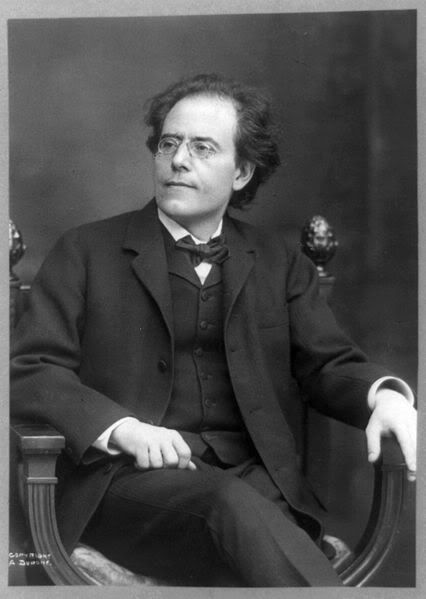Gustav Mahler

His Life
Mahler was born in Kalist (Kalischt, Kaliste), Bohemia. His parents moved to Jihlava, Moravia in the first year of his life, where Mahler spent his childhood. In 1875 he was admitted to the Vienna Conservatoire where he studied piano under Julius Epstein. Subsequently, Mahler attended lectures given by Anton Bruckner at Vienna University. His first major attempt at composition came with Das Klagende Lied which he entered in a competition as an opera (he later turned it into a cantata). However, he was unsuccessful, and turned his attention to conducting. After his first conducting job at Bad Hall, he took posts at a succession of increasingly larger opera houses; Ljubljana in 1881, Olomouc in 1882, Kassel in 1884, Prague in 1885, Leipzig in 1886 and Budapest in 1891. He then secured his first long-term post at the Hamburg Opera in 1891, where he stayed until 1897. While there, he took his summer vacations at Steinbach-am-Attersee, during which he concentrated on composition. He completed his Symphony No. 1 and the Lieder aus "Des Knaben Wunderhorn" in this period.
In 1897, Mahler converted from Judaism to Roman Catholicism in order to secure a post as artistic director of the prestigious Vienna Opera (Jews were virtually prohibited from holding the post at that time). For the next ten years he stayed at Vienna, where he was noted as a great perfectionist. He ran the Opera for nine months of the year, spending the other three composing, mainly at Maiernigg, where he had a small house on the Wörthersee. There he composed his symphonies 2 through 8. He married Alma Schindler (1879-1964) in 1902. They had two daughters, the elder of whom died in 1907. In the same year he discovered he had heart disease, and he lost his job at Vienna, hounded out by a largely anti-Semitic press after trying to promote his own music, which was not well received on the whole. While his 4th Symphony was well received by some, not until the performance of his Symphony No. 8 in 1910 did Mahler have a true public success with his music. The pieces he wrote after that were not performed in his lifetime.
Mahler was coming under increasingly virulent anti-semitic attacks — in 1907 these became almost unbearable — when Mahler received an offer to conduct Metropolitan Opera in New York. He conducted a season there in 1908, only to be set aside in favor of Arturo Toscanini. Mahler returned to New York the next year to become conductor of the newly formed New York Philharmonic Orchestra. Around this time, he completed Das Lied von der Erde, and the Symphony No. 9, which turned out to be his last completed work. During his last visit to America in February 1911, he fell seriously ill and was taken back to Vienna at his request. He died there from a streptococcus infection on 18 May 1911 in Vienna, Austro-Hungarian Empire (now Austria), leaving his tenth symphony incomplete. He is buried there in the Grinzinger Cemetery.
His Music
Gustav Mahler began from the German tradition of music, which was rooted in the music of Johann Sebastian Bach and the "Vienna School" of Haydn, Mozart, Beethoven and Schubert, and incorporated the Romantic generation of composers, such as Schumann and Mendelssohn. However, the decisive influence on his work was Richard Wagner who, he said, after Beethoven was the only composer to truly have "development" (See Sonata Form) in his music.
Mahler combined the ideas of Romanticism - including having titles for symphonies, or combinations of movements - and the use of song melodies in Symphonic works - with the huge orchestral resources which the development of Symphony Orchestras had made possible. The result was that he extended, and finally broke, the understanding of symphonic form, as he searched for ways to expand his musical universe. He stated that a symphony should be an entire world. Mahler, as a result, met with difficulties in presenting his works, and would continually revise the details of orchestration until he was satisfied with the effect.
Mahler's symphonies are generally divided into three periods. The first, dominated by his reading of the "Wunderhorn" poems, and incorporating characteristic melodies from his song settings of them, includes the first four numbered symphonies. His second period, including the next three symphonies, focuses on increasing severity of expression, including the "Tragic" symphony, whose hammer blows shocked Viennese audiences, and inspired other composers. His last period is marked by increasing polyphony and includes his Eighth, Ninth, and unfinished Tenth Symphonies, as well as the song cycle-symphony of "Das Lied von Der Erde".
Mahler was obsessed by Beethoven's legacy, and was both terrified of writing a ninth numbered symphony, and declared that all of his symphonies were "Ninths", meaning symphonies which had the same impact and scale as the famous D Minor. Few composers can be said to have freely intermixed their work and their life so completely. In the MS of the 10th Symphony, there are notations to his wife Alma, who was at the time having an affair with Walter Gropius (her future husband), as well as other autobiographical references. He was deeply spiritual, and was described as "always telephoning God" and describing his music in terms of Nature, in a way that demands a capital "N" in English.
This resulted in a view of his music as "hyper-emotional" for a long time after his death, and even extreme. And it is certainly true that he restlessly searched for ways of extending symphonic expression - but he was also an ardent craftsman, which shows in his meticulous working methods, and careful planning of works, as well as his studies of previous composers.
His Legacy
Mahler's pivotal role in what followed made him, in some respects, the Haydn of modern music. His compositions had a tremendous impact on Schoenberg, Webern, and Berg immediately, as well as the conductors Bruno Walter and Otto Klemperer - both of whom worked with Mahler and were helped in their careers by him, and would take his music to America, where it would influence Hollywood film composition. He was also an influence on Erich Korngold and on his friend and contemporary Richard Strauss as well as the early symphonies of Havergal Brian. His innovations include melodies with far reaching implications for harmony, expressive use of combinations of instruments, in both the large and small scale, larger percussion sections, as well as combining voice and chorus in the symphony form, and more extreme voice leading in his counterpoint.
Read more of Mahler's life
Symphony No. 1
The Bavarian Radio Symphony Orchesta conducted by Rafael Kubelik (1968)
Symphony No. 9
The Berlin Philharmonic conducted by Herbert Von Karajan (1982)
Songs of a Wayfarer
The Bavarian Radio Symphony Orchesta conducted by Rafael Kubelik (1968)

